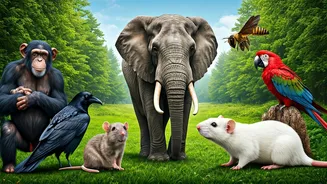Introduction to Animal Intelligence
Animal intelligence is a captivating area of study that focuses on cognitive abilities such as learning, problem-solving, and communication. The assessment
of intelligence can be challenging, as different species have unique traits and ways of interacting with their environments. However, research continually uncovers remarkable examples of advanced cognitive skills. The degree of intelligence can be influenced by multiple factors, including evolutionary pressures, social structures, and habitat complexities. Animals' intelligence levels can also vary within a single species, depending on individual experiences and environmental opportunities. Studies of animal behavior not only deepen our comprehension of the natural world, but also shed light on how diverse strategies have evolved to succeed in varying ecological niches. The following sections will introduce some of the most intelligent animals.
Chimpanzees: Masters of Tools
Chimpanzees are renowned for their remarkable cognitive capabilities. They exhibit advanced tool use, such as using sticks to fish for termites or stones to crack nuts. They possess an intricate social structure, marked by complex relationships and strategic alliances within their groups. Chimpanzees can also learn from others through observation and imitation. They are capable of recognizing themselves in mirrors, demonstrating a sense of self-awareness. Furthermore, they are known to exhibit emotional responses that mirror human emotions. These behaviors underline their complex understanding of the world around them. Research has shown that their cognitive abilities, particularly tool use and social learning, are critical to their survival and adaptability in various habitats. Their high degree of intelligence is apparent in a number of behaviors and capabilities.
Bottlenose Dolphins: Socially Intelligent
Bottlenose dolphins show remarkable cognitive abilities, particularly in their social interactions. They live in complex social groups, using sophisticated communication methods, including whistles and clicks. They use echolocation to navigate, hunt and identify objects. They can solve problems and use tools, such as sponges to protect their snouts while foraging. These marine mammals demonstrate a high level of empathy and social intelligence. Research also reveals that dolphins exhibit a form of self-awareness and can understand symbolic communication. Their capacity for learning, cooperation, and social complexity showcases their intelligence. The advanced cognitive abilities of dolphins, including tool usage and sophisticated communication, allow them to prosper in complex aquatic environments.
Crows and Ravens: Clever Problem Solvers
Crows and ravens are known for their intelligence, displaying remarkable problem-solving skills and adaptability. They have been observed using tools to obtain food, such as bending wires to create hooks to retrieve items. They also show impressive memory capabilities, including the ability to remember the location of food caches for extended periods. These birds show that they can plan and anticipate future events. They have shown that they can recognize individual faces, and will be able to distinguish between friends and foes. Additionally, they often live in complex social groups, showing social learning and cooperation. Their intelligence allows them to flourish in various environments. The remarkable intelligence of crows and ravens is demonstrated by their adaptability, their cognitive abilities, and their sophisticated social behaviors.
Elephants: Socially and Emotionally Aware
Elephants are highly intelligent, with complex social structures and emotional intelligence. They live in close-knit family units and exhibit intricate communication. They show empathy and compassion, often aiding injured members of their herd. Elephants demonstrate advanced problem-solving skills and have excellent memories. They are capable of recognizing themselves in mirrors, indicating self-awareness. Research has shown that elephants also show the capacity for grief and mourning. Their intelligence is revealed by their complex social structure, emotional understanding, and problem-solving abilities. Their ability to form deep social bonds and their understanding of complex emotions helps them survive in varied and difficult conditions.
Octopuses: Masters of Disguise
Octopuses are incredibly intelligent invertebrates known for their problem-solving and adaptable nature. They have the ability to solve mazes, unscrew jars to get food, and have demonstrated the ability to use tools. Octopuses possess camouflage abilities that allow them to blend into their surroundings, changing their skin color and texture to match their environment. They have remarkable memory skills and have shown the capacity to learn from observation. They exhibit individual personalities and can adapt to new environments. Their cognitive abilities allow them to excel in diverse aquatic habitats. The intelligence of octopuses is highlighted by their adaptable and intelligent nature. This includes their capacity for problem-solving, their ability to use tools, and their remarkable camouflage abilities.
Dogs: Loyal and Intelligent
Dogs have demonstrated significant intelligence and the ability to learn complex tasks. They can recognize and respond to human emotions, and have been trained to perform a variety of tasks, from assisting people with disabilities to detecting illnesses. Dogs are well known for their social bonds with humans and their ability to interpret human communication. They show a diverse range of cognitive abilities, including problem-solving, memory, and spatial awareness. The degree of intelligence varies among breeds and individual dogs. Dogs have also shown the capacity for abstract thought. Their capacity to form close bonds with humans and their ability to understand communication indicate their intelligence. This has allowed them to adapt to diverse environments.
Pigs: Surprisingly Clever
Pigs have proven themselves to be intelligent animals with impressive cognitive abilities. They are known to have complex social lives, including communication and cooperation within their groups. Pigs have demonstrated the ability to solve problems, such as navigating mazes or using mirrors to find food. They are capable of learning various tasks, and exhibit excellent memories. Research indicates that pigs are also capable of experiencing a range of emotions. Their intelligence allows them to interact with their environment in advanced ways. The cognitive abilities of pigs, including their social dynamics, memory, and their problem-solving capabilities, make them surprisingly intelligent creatures.
Sea Lions: Agile Learners
Sea lions have shown that they have a range of cognitive skills, including learning and problem-solving. They are known to learn complex tasks, such as performing tricks. They have a high degree of social awareness. Sea lions use vocal communication to interact with each other. These creatures are able to remember visual and audio cues. Their cognitive skills enable them to thrive in aquatic environments. Sea lions' intelligence, particularly their ability to learn, solve problems, and their social awareness, highlights their adaptive capabilities.






















